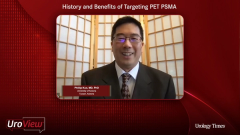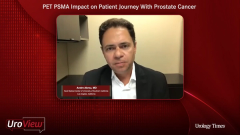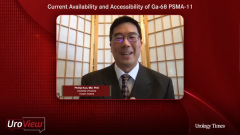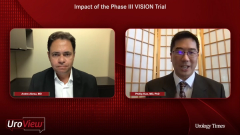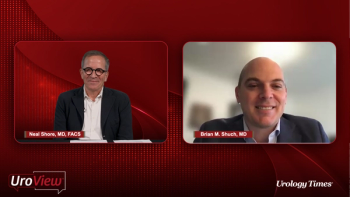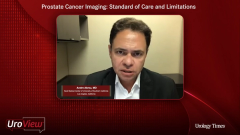
Current Availability and Accessibility of Ga-68 PSMA-11
The FDA’s approval of Ga-68 PSMA-11 and its impact on ensuring accessibility of generator versus cyclotron for new radiotracers is discussed from a nuclear medicine perspective.
Episodes in this series

Phillip Kuo, MD, PhD: To move on to the next question, which is important to discuss, particularly due to the approval in December of 2020—gallium-68 PSMA-11 was approved by the FDA, and will therefore officially be the first PSMA [prostate-specific membrane antigen] PET [positron emission tomography] imaging agent to be approved. It was a joint effort, for those of you who do not know, by UCLA (the University of California, Los Angeles) and UCSF (the University of California, San Francisco). Real kudos to those teams who came together from 2 institutions. That is really what the field needed, this cooperative effort. Obviously, there were big teams in each group, but Thomas Hope, [MD,] from UCSF and Johannes Czernin, MD from UCLA are their leaders. Again, kudos to their teams on both sides. I am going to talk a little about what this means from the nuclear medicine perspective. Of course, for those of you listening, talk to your respective imaging centers because it depends upon your regional availability of things. We do not use gallium-68 tracers too much. There actually is another one approved; urologists may not know about it, but they may have heard about it in their surgery conferences. That is gallium-68 dotatate or Netspot, and that is basically a PET octreotide scan, for those of you who may know that. That is a detection of neuroendocrine tumors, so we have had a gallium-68 approved PET tracer.
This is nothing new, but obviously there are a lot more cases of prostate cancer than neuroendocrine tumors. One of the differences in gallium-68 compared to F18 [fluorine-18] is that F18 is exclusively cyclotron-produced. You may not have known that, but in all those FDG [fluordeoxyglucose] PET scans that you ordered, the F18 comes from a cyclotron nearby. F18 has a half-life of approximately 2 hours. Gallium-68—this is easy to remember for your next dinner conversation—has a 68-minute half-life. It is very fortunate; you do not have to have a great memory to remember that. It has both options. It can be made by a cyclotron; the same cyclotron that makes your F18 can make it, but it requires a different target. Just because it may have a cyclotron that can do it does not mean it is making it right now. The other way it is made is through a generator. Some people may have heard of generators, like how we get technetium-99; your hospital may have that technetium-99m generator.
It is a different generator, but there is the same idea; it’s portable. It can literally sit on the counter, this gallium generator, which is very nice because if the half-life is only 68 minutes, you cannot transport it very far. The range that your cyclotron facility can deliver F18 may not be expansive if you are right at that 2-hour limit. That is too far, in many circumstances, for the gallium-68. There are some places that can be supplied with a gallium-68 PSMA-11 and other radiopharmaceuticals that you cannot necessarily deliver from a cyclotron facility. I must emphasize that when it comes to our radiopharmaceuticals, they tend to be very expensive. A lot of the success relies on commercial availability, right? Is it commercially viable? Just because you have a cyclotron there or a generator here capable of doing it, you still have to make it commercially viable. Check with your imaging sites to know their availability, the timeframe they can deliver within, and the supply chain. Initially, when they are first ramping up, they may not be able to deliver it, for example, every single day, so you may have to adapt that schedule. Dr Abreu, as a clinician, can you give us any thoughts on the impact of cost on the accessibility for your patients?
Andre Abreu, MD: Yes. Fortunately, from our side, we have this approved, but it is still a great effort, as you said, from great leaders and institutions, and kudos to all of them. Thanks to them, and thanks to the fact that we have some here in California and in Los Angeles that have been helping us for quite some time. Even when they were running the trials to get approval from the FDA, we used to get our patients scanned over there because it acted as a better assessment for us. This is really needed. Sometimes we face some situations and we say, “I wish I had this imaging available.” Now we do, and this is a major change.
Unfortunately, the other side is that there are still only a few centers that can provide this. As far as I know, these are all cash-paid. Insurance does not cover this; it is not available for the population overall. This limits usage to our patients who can afford it, but at least it is a beginning. PET PSMA has been out there for quite some time, and patients ask, “Why don’t we have this in the United States?” Now we do. Again, with time, this will spread. Many institutions will have this; the costs will go down, and we will be able to scan as many patients as needed, as a clinical indication.
Phillip Kuo, MD, PhD: Thank you. The regulatory hurdles and everything are confusing even to people in the field. The FDA approval does not mean automatic reimbursement to those who are not so familiar with this process. It is very confusing to everyone; we have seen it before with radiopharmaceuticals, approval does not equal automatic reimbursement. But it was a huge hurdle. It opens the doors and lowers the barrier for a lot of people to get into research with PSMA-11. It will prove that these PSMA agents as a class are successful, and that is encouraging for the further approval of other PSMA agents, and also commercial reimbursement from Medicare and CMS [Centers for Medicare & Medicaid Services]. Usually from there, it will follow that the private payers will follow Medicare.
Transcript edited for clarity.
Newsletter
Stay current with the latest urology news and practice-changing insights — sign up now for the essential updates every urologist needs.

